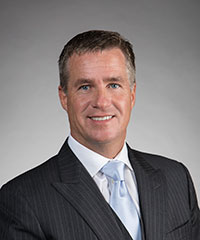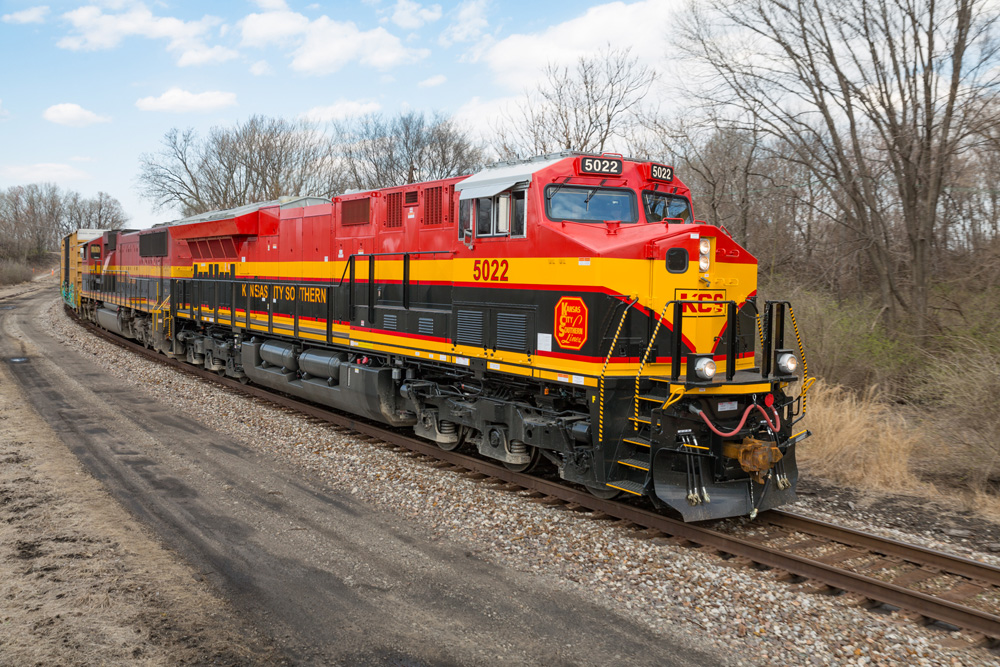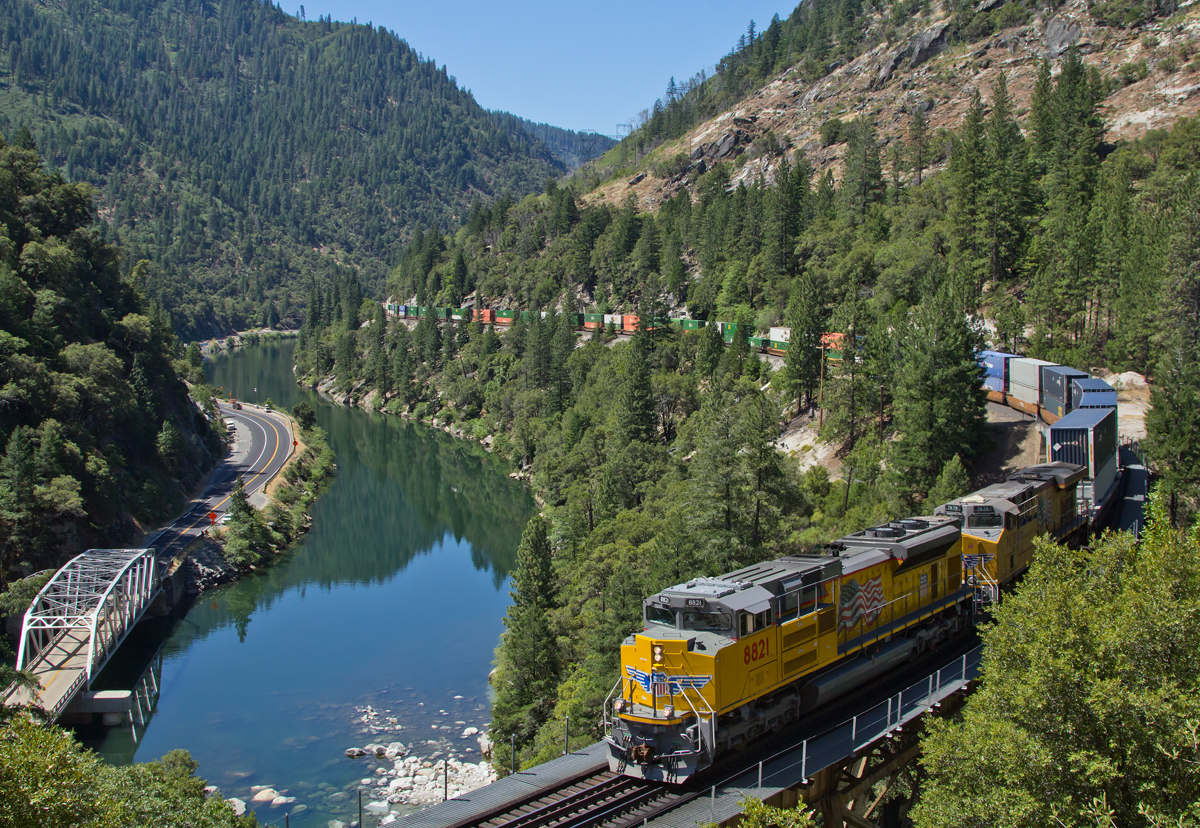“I want them all to do it … I think it’s the right way to run the business,” Creel told an investor conference last week. “I think it’s the healthy way to run the business. And inevitably as they succeed, we’re going to benefit from it. So I’m their greatest fan. I’m cheering them on and I’ll give them any insight I can give them.”
Creel was as surprised as anyone about how quickly Precision Scheduled Railroading has moved from the Canadian railroads to the U.S.
“I never would have guessed a year and a half ago that PSR, which was the thing to stay away from, would be the new topic of the day,” he says.
Creel was asked if BNSF Railway could remain the lone PSR holdout as the rest of the industry changes.
“The simple answer is, I think, no,” Creel says.
It will be increasingly difficult to compete for business against a rival that has a cost and service advantage, he contends.
“I truly think it’s a matter of time. I think it’s inevitable. It eventually has to happen,” Creel says.
BNSF, a unit of Berkshire Hathaway, is not publicly traded like the other big systems. And its outgoing executive chairman, Matt Rose, has been critical of PSR this year.
“There’s been a lot of naysayers. There’s been a lot of spin,” Creel says. “You talk about some of the people who were most vocal against it that are doing it now. Some of the things they believed at the time, and I’ve got to just assume that they believed it to be true that it couldn’t be done. They’re believers now.”
Norfolk Southern dismissed PSR as a “short-term, cut-to-the-bone strategy” while CP was pursuing an unfriendly merger in 2015-16. Now NS says it’s adopting PSR because it works.
It’s too early to judge the operational changes that are under way at Union Pacific, NS, and Kansas City Southern, all of which began adopting their own versions of PSR late last year.
“I think it’s early to talk about progress,” Creel says. “They’re saying the right things and they’re focused on the right buckets.”
But Creel, who praised UP and NS for involving customers in service changes, says the railroads will have to make “tough decisions.”
“Because at the end of the day, to do PSR, you’ve got to right-size assets,” Creel says. “That means not just locomotives and cars — the men and the women that work on them, the terminals that are required to support that work that’s being done. There are a lot of tough decisions that have to be made that short-term can create some angst and some pain and some broken eggs, for lack of a better term. But long-term it’s what you have to do. It’s what’s necessary to run the business in a healthy way.”
Creel says PSR will create capacity in the industry as railroads haul the same tonnage using fewer trains, locomotives, and freight cars. And that will help relieve congestion in Chicago, which 25 percent of North American rail traffic touches in some fashion.
The PSR railroads are also more likely to work together to create new interline service that improves Chicago or avoids it altogether by using alternative routes, Creel says.
Creel also spoke about CP’s operating ratio, which was the industry’s second-lowest in 2018. “To us, the O.R. story is an outcome. It’s not really where the focus is,” he says.
Creel, who worked with Harrison at Illinois Central and Canadian National before joining him at CP and succeeding him as chief executive in 2017, spoke last week at the Citi 2019 Global Industrials Conference.















The only problem with all the negitive comments is you are ignoring the fact that PSR has been working very well at CN and CP. Doesn’t seem to be exactly ‘short term’. How many years has CN been doing this? They don’t appear to be on their death bed, for sale or up for liquidation. Looks like they did something that dramatically IMPROVED service while also lowering costs. They can’t keep up with the growth. Oh, that’s right, it was just smoke and mirrors to skim the profit for the investors, I guess I missed something, because it looks to me that, as I’ve said before, if you were on the loosing side of PSR, you really hate it. On the other hand, if you joined the program, you’re doing pretty well now.
Doing well… that depends on how you measure your success. From a purely financial standpoint, yes, they’re doing well. At CN, PSR implementation was totally chaotic and only started getting better once Harrison left the property, and so many of his destructive policies were reversed (and incompletely so, see the current operating mess caused by something never heard-of in Canada before: Winter).
Harrison’s subsequent “success” at CP resulted in CN grabbing a large share of traffic dropped by CP, and several shippers simply moving their traffic on the highway.
PSR is successful in right-sizing the railroad’s assets to an artificially-downsized traffic flows. What it’s not very good at is right-sizing it to future traffic flows, which will change as economics dictate. When you’re not replacing the lost traffic (i.e. shippers closing door, merchandise flows changing, etc) by new traffic, you are slowly, but surely, pulling yourself out-of-business.
It’s all about the share holder and the CEO making money, the customers and employees are last, I work with railroads all day and I have yet to find any customer thats happy with psr. Hopefully the bn is smart enough to not do it.
Sounds like a guy who can level-set the table-steaks in a going forward space to synergize the corp-competencies with the best of them.
Like lemmings headed for a cliff… more money spent on share buy backs than on capital replacement, much less capacity additions. Short term-ism at its worst. This is all about greed of hedgies and executives that stuff their pockets with stock options.
There will be a significant price to pay for the asset stripping under the guise of PSR.
Gerald, you are correct regarding the Class I’s being publicly traded with the exception of BNSF Railway.
Keith Creel did note this difference: “The thing I don’t have control over is that railroad’s accountability to one shareholder versus mine to multiple shareholders is a different measure.”
That was omitted from the story in the interest of brevity. But since you raised that point, I offer this to fill in the gap. Thanks for reading.
BNSF will be the lone ranger. Wall St. loves the short term return of PSR. This is the only reason it has spread so fast.. What publicly traded RR wants to lose it large pool of capital? As Matt Rose said base performance on gross ton miles not earned revenue
There’s several problems with his comment about BNSF, first and foremost, it’s a privately held railroad and doesn’t have to answer to shareholders. Secondly, they continue to increase revenue and add volume…all without heading towards PSR. Third, I think he’s 100% wrong about their ability to compete with the UP, they mostly cover the same territory(mostly), but they offer far superior service and as far as pricing goes…when I worked in logistics the prices quoted by the two carriers were in most cases almost identical, the biggest difference was in who actually performed the service. I leave you to figure that one out.
Drinking Harrison’s Kool-Aid has affected management’s ability to think. It has destroyed customer service and morale within every railroad the Harrison has touched. Anyone can cut costs, slash capital expenditures in order to reap short term objectives. You create big issues that will not go away and the problems will destroy the company. Harrison was a prick who loved to fire people who disagreed with him. He destroyed customer service at CP. Compare CN to CP and there is a BIG DIFFERENCE. Mr. Creel won’t be around long enough to fix the problems that his buddy created.